Fourth in the series, this presentation provides advice to new researchers about preparing to apply and interview for a faculty position, as well as considerations for negotiating a startup package
The following is a transcript of the presentation video, edited for clarity.
There is not just one yellow brick road that takes you to social impact, R01s, tenure, pursuit of happiness and lots of stuff. There are lots of different roads of different colors and different difficulties. So the idea is this: What can we say about what those pathways are, and what are some guidelines that might be useful to you as you consider your own pathway?
How to Negotiate for a Position?
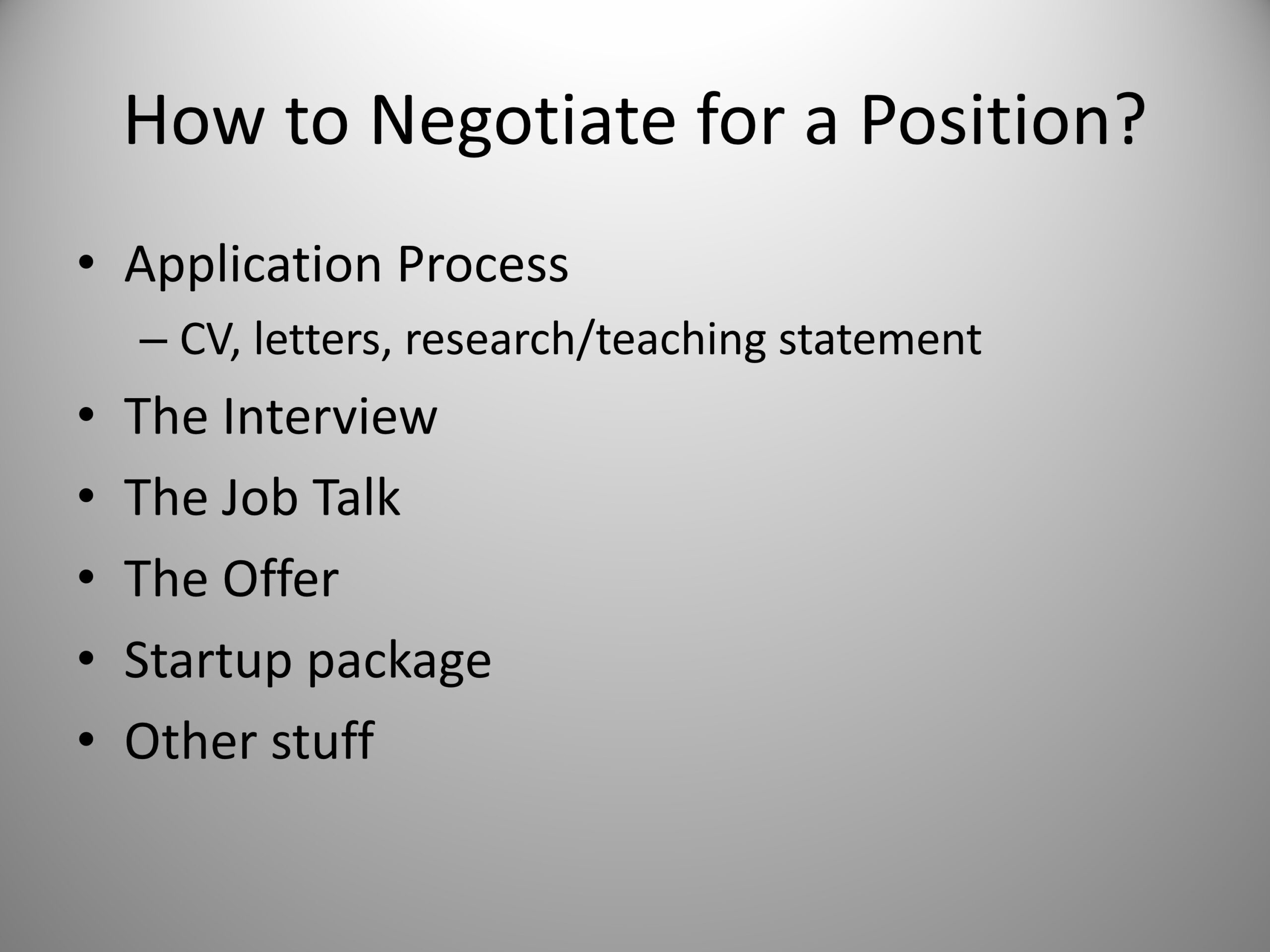
How to negotiate for a position. What we’re interested in here is things like the application process. The big three: Curriculum vitae or resume research and teaching statement. Go to an interview. Have a job talk. See an offer. Deal with the startup package and various other stuff that we’ll talk about. Now this is extremely important. But it seems to me that very many people enter into this without really understanding much about it. They don’t really know what the issues are. They don’t really know what flexibility they have. And they don’t really know if they’re in a good position to bargain. They often feel very innocent. And they feel uninformed. So let’s see what we can do.
Now what I’m going to do is to have two people who are going to do this point counter point. So I’ll be Dr. Snyde on this one.
“Dr. Snyde”: You’re up against tons of experience. So do your homework.
Picture this.
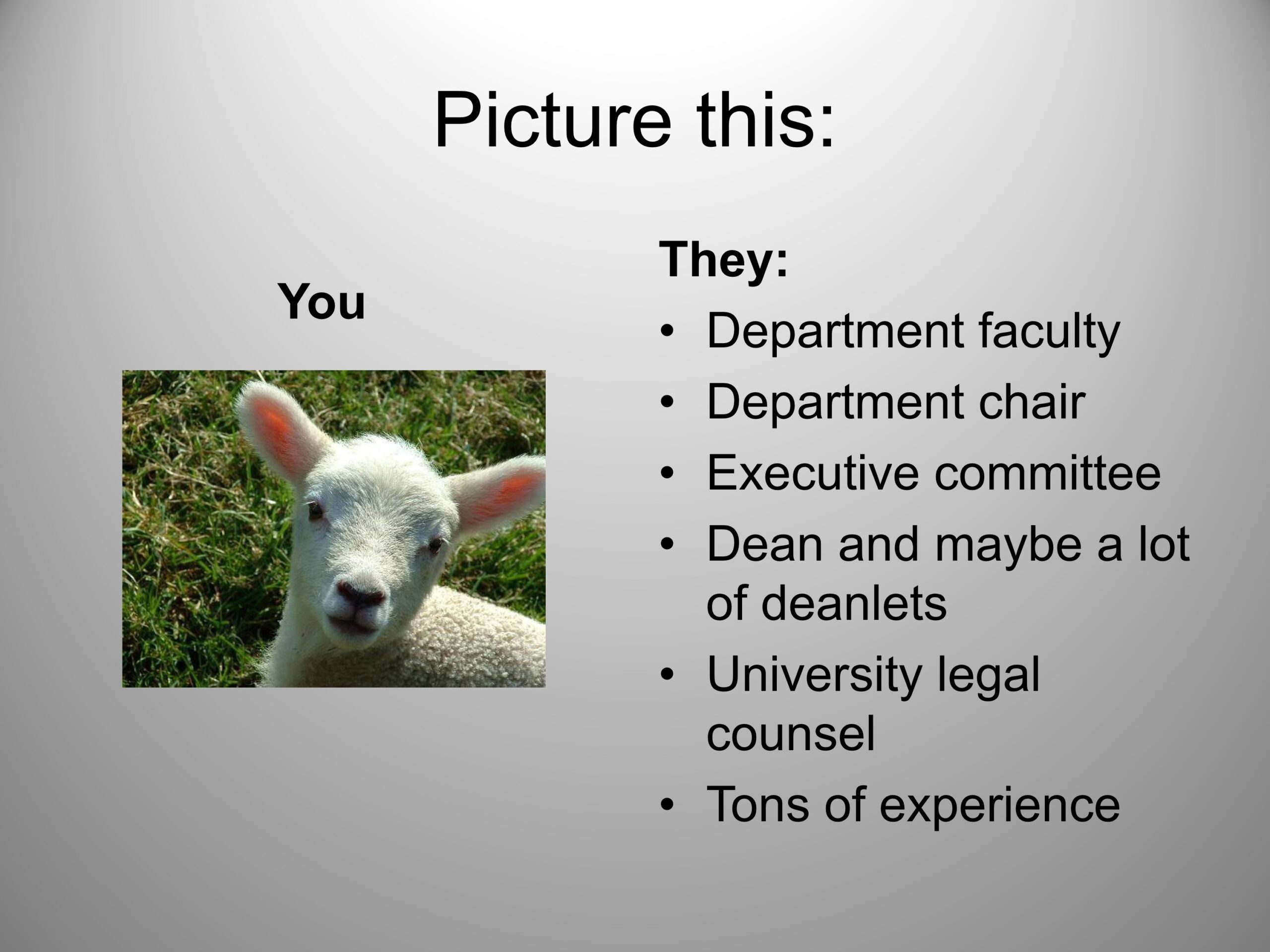
You.
They.
You are against the department chair. The faculty of that department. The executive committee. The dean and maybe a lot of little deanlets running around. University legal counsel, and tons of experience. These people have gone through these contracts. They know them forward and backward. Everything that they put down is going to protect the institution. Be sure of that.
So here’s you. Have you ever even seen a contract letter before? Have you written one? Have you ever looked at anybody else’s? You look at, well gee, I guess it’s okay. So what we need to do is to say what role do you play in this position in this process. And what can you do?
How to Interview for a Position and Negotiate for Initial Contract
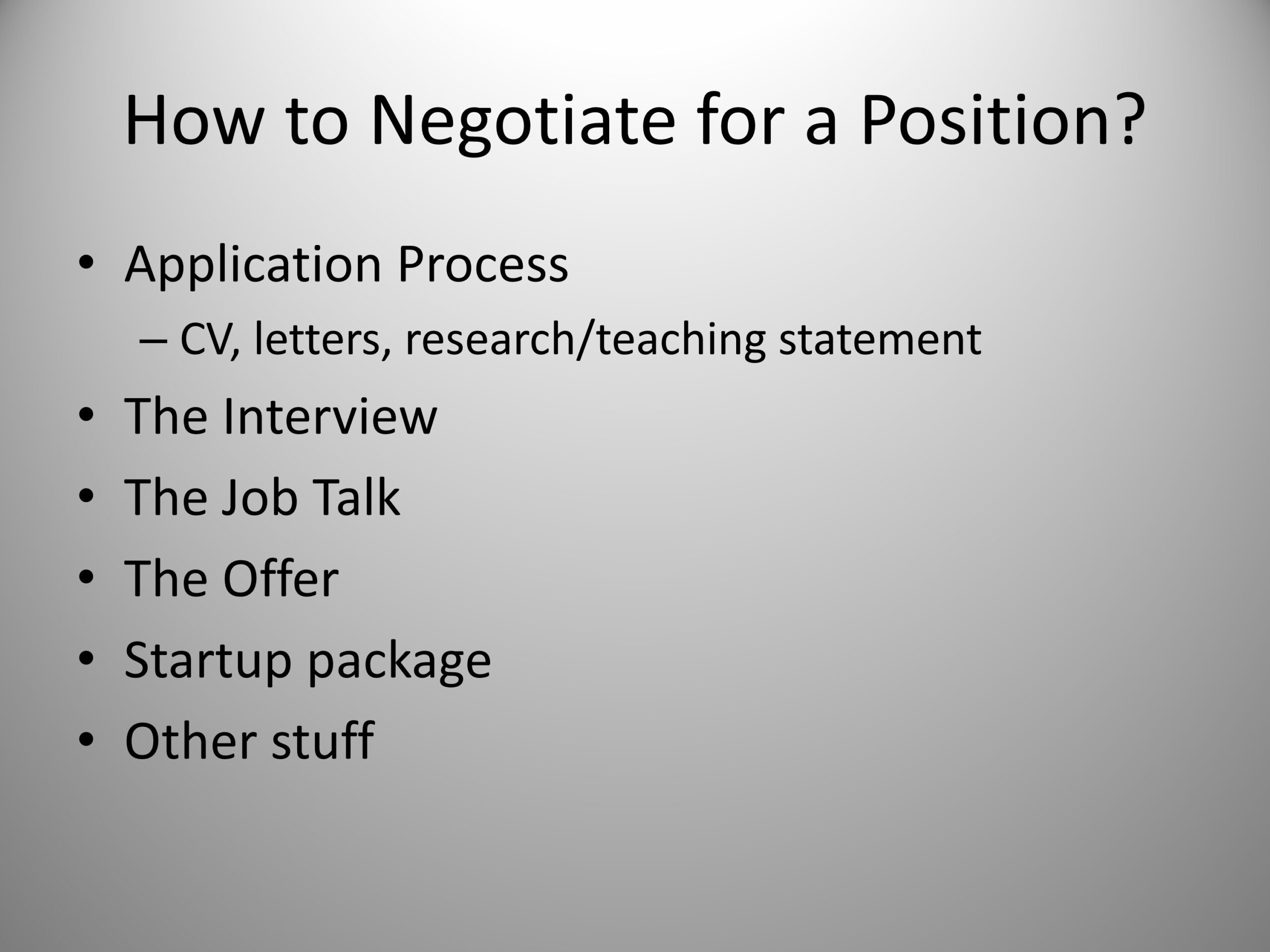
So this is general advice.
- First, do you homework before the interview. You want to know something about that institution. You want to know something about the faculty. You don’t want to walk in as though you’ve never heard of it. You don’t want to act as though you know nothing about the faculty.
- You don’t want to walk in having no idea what their resources are. You want to make it clear that you are interested in them. And if you’re interested, you will have done some background work.
- Prepare and rehearse your job talk. And we’ll say more about that later.
- Outline a startup package. And we’ll definitely say more about that.
- Take notes as you go through the process. Because there are things that are easy to forget. Particularly if you are fortunate enough to get invited to three or four place, it can be very hard to keep straight. What did this place offer? What did that place offer? Feel free to take notes. Nobody will be offended. It shows that you’re very interested and serious.
- Take notes on lab space earned equipment. Shared resources. Possible collaborations.
- When you’re done, write a thank you note. Send the department a thank you note.
- Then review and compare with other job visits. Because you may be in the happy situation of having to choose among three or four possible offers.
The Interview
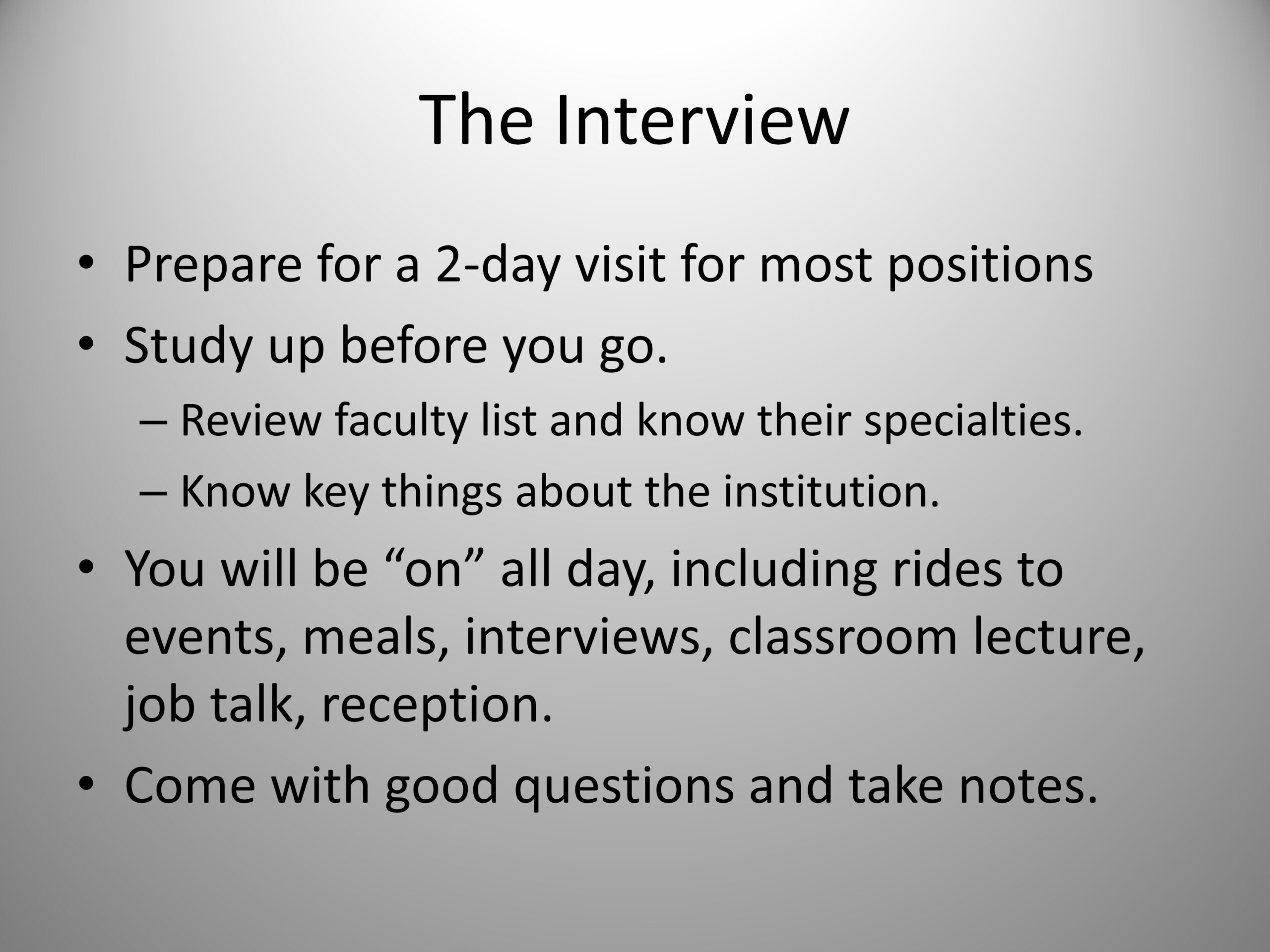
The interview itself. Prepare for a 2-day visit for most positions. Sometimes longer. Sometimes shorter. But usually 2 days. You will be busy.
Study up before you go. As mentioned, review the faculty list and know there are specialties. Know a few key things about the institution. Something beyond how their football team did.
You will be on all day. During rides to events. During meals. Interviews. The classroom lecture you might be invited to give. The job talk and the reception.
Come with good questions and take notes. And don’t be concerned if you ask the same question of more than one person. Because they sometimes give you different answers.
The Job Talk
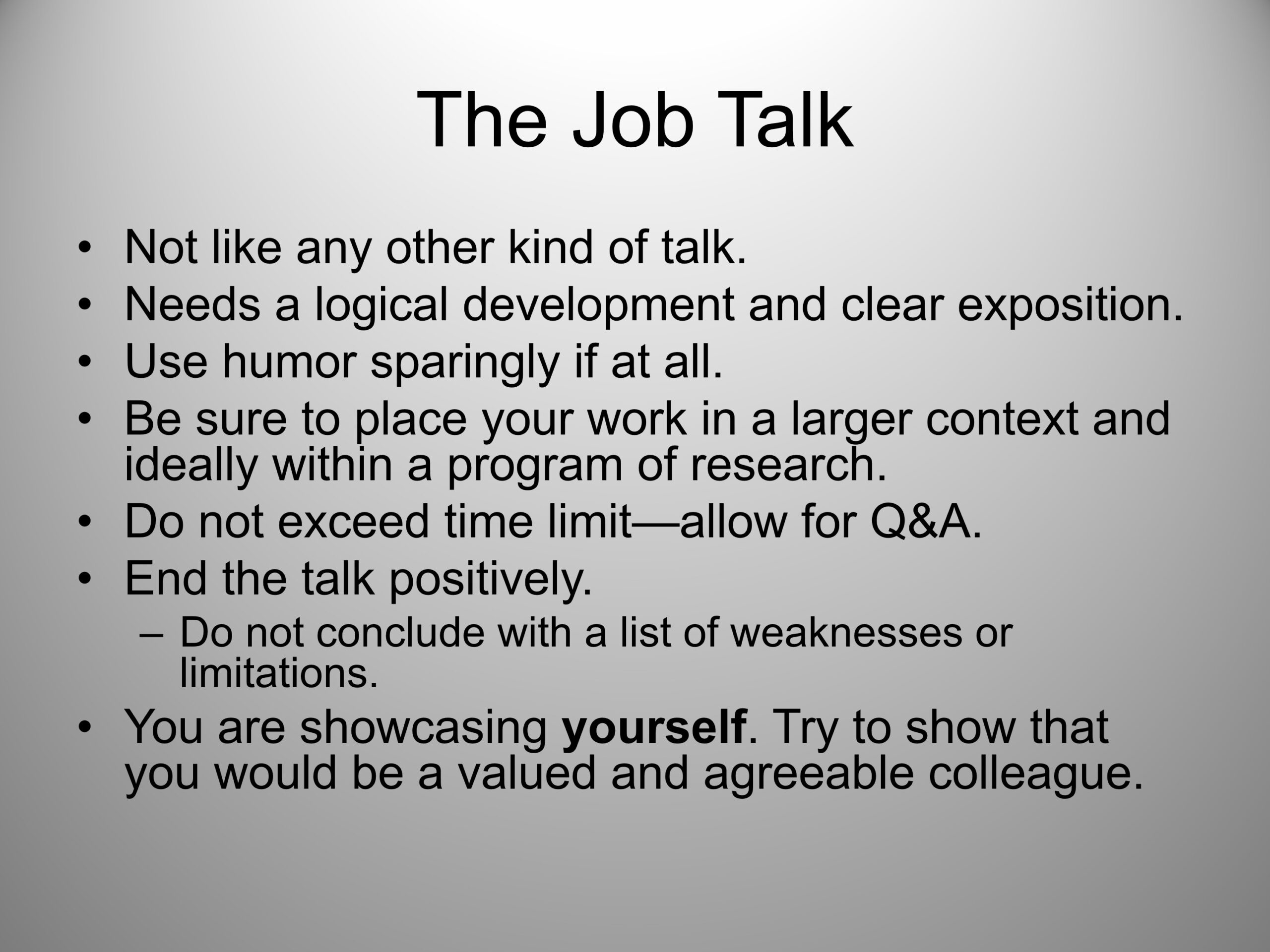
The job talk. It’s not like any other kind of talk.
It needs a logical development and a clear exposition.
Use humor sparingly, if at all. Humor has no place in any professional venue. Never use it.
Be sure to place your work in a larger context, and ideally within a program of research. Because after all, you’re not selling just yourself and one little project. You’re saying, I’ve got a research program for you, and this is really going to put you guys on the map. You don’t have to say that, but you could at least say, this is an important program. It’s really going to complement your department.
Do not exceed your time limit. Absolute no-no. Never, never speak to the very end of the time, because they want to ask questions. It’s a very important part. And it’s insulting, disrespectful to your audience if you go over the limit. If you’re invited to speak for 50 minutes or 60 minutes, speak no more than 40. Make sure you say what you need to say in 40 minutes, and then sit back and then deal with the questions and answers.
End the talk positively. Do not conclude with the list of weaknesses and limitations. Like, “Well I know this didn’t really answer the question. I guess I should have done this.” That’s not the thing to do.
Remember, above all you’re showcasing yourself. To show that you would be a valued and agreeable colleague. They need to like you. They should like your research project too, but they should like you. Which would be something where they say, I can see that person as a colleague. I can see that person teaching in a classroom.
Start Large. Narrow Middle. End Large.
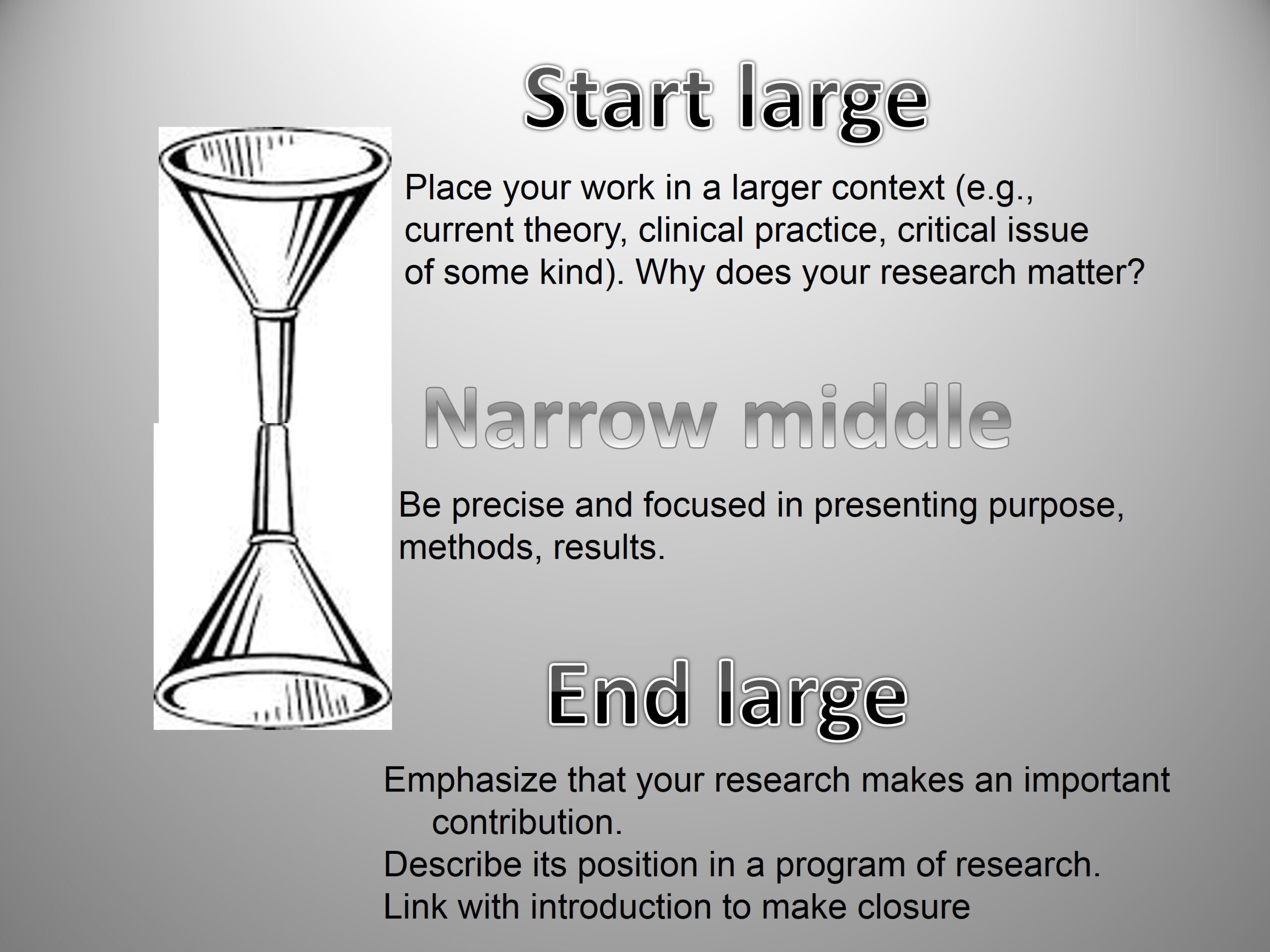
So general advice for job talk.
- Start large. Place your idea in a larger context of theory. Clinical practice. Critical issue of some kind. Indicate why your research matters. Make sure that people understand that this is big stuff. It’s important. It has consequences.
- Then the narrow middle. Be precise and focused in presenting your purpose, methods, and results.
- And then open again at the end. End large. Emphasize that your research makes an important contribution. Describe its position in a program of research. And link with an introduction to make closure.
Other Job Talk Tips
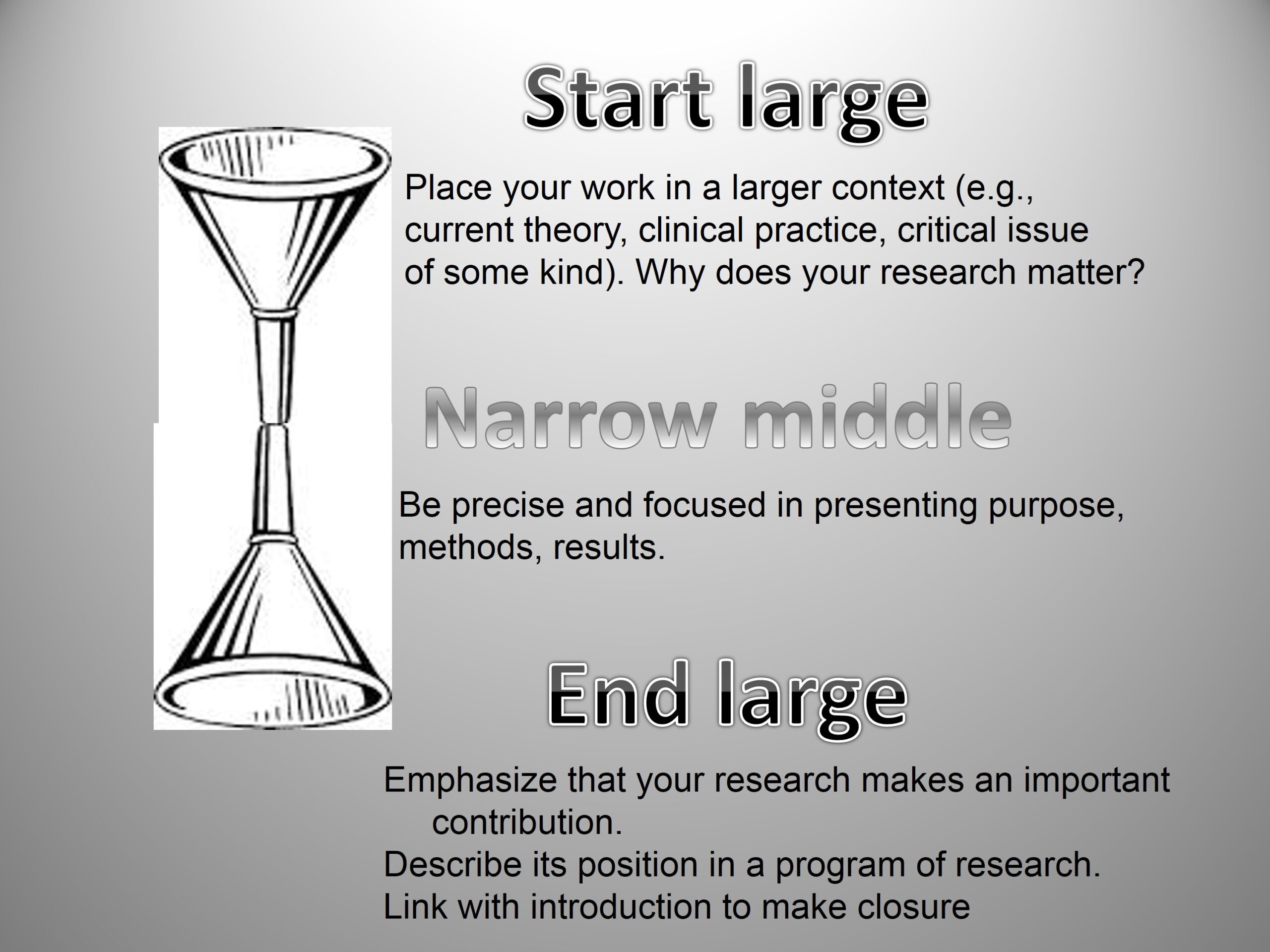
Other job talk tips:
- First practice, practice, practice your job talk. Get your friends to sit in front of you and have them evaluate the feedback.
- Check on the visibility and readability of your slides. Go to the back of a room and make sure that people can actually see the data that you’re talking about.
- Proofread your slides.
- If a question is too complicated, or takes you into unwelcomed territory, invite the asker of that question to meet with you afterwards. Being polite, like, that’s really a good question. Why don’t we meet afterwards, and I’ll tell you some of the background that I’ve been thinking about that leads to that.
- Show that you’re enthused about your work. Very important. You want to show that you are excited to carry this on. And wherever you end up, you’re going to be able to do this work, and you will do it because you love it.
“Professor Heckle”: The startup package will get you going sooner and faster than anything else you can do.
We’ll switch to Dr. Heckle. Who is generally agreeable with what Dr. Snyde has said so far.
Startup Package
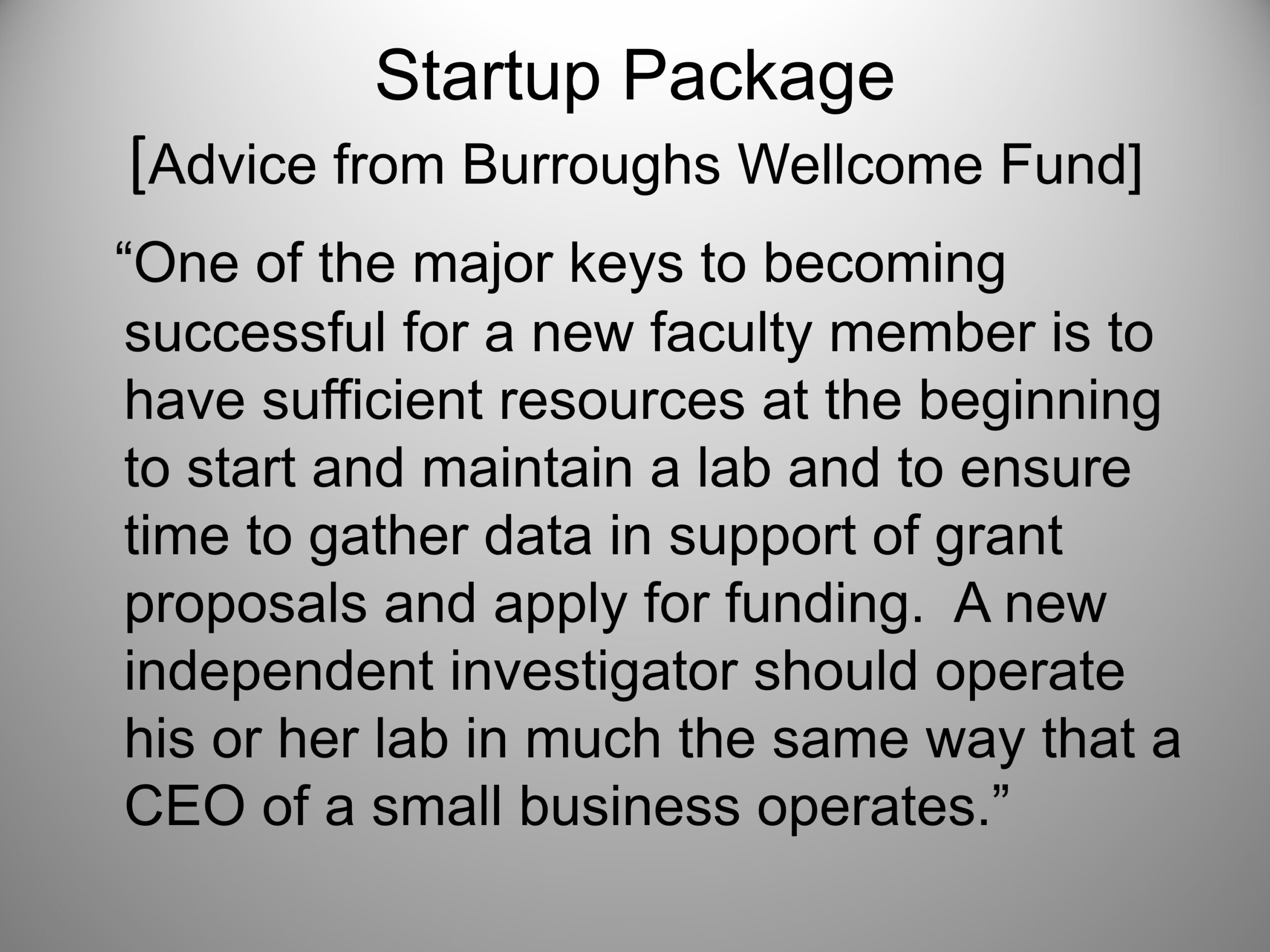
This is a quote from the Wellcome Burroughs Fund, which supports a number of investigators, PhDs and physicians. So they say, “One of the major keys to becoming successful for a new faculty member, is to have sufficient resources at the beginning to start and maintain a lab. And to ensure time to gather data in support of grant proposals and apply for funding. A new independent investigator should operate his or her lab in the same way that CEO of a small business operates.”
Designing a Startup Package
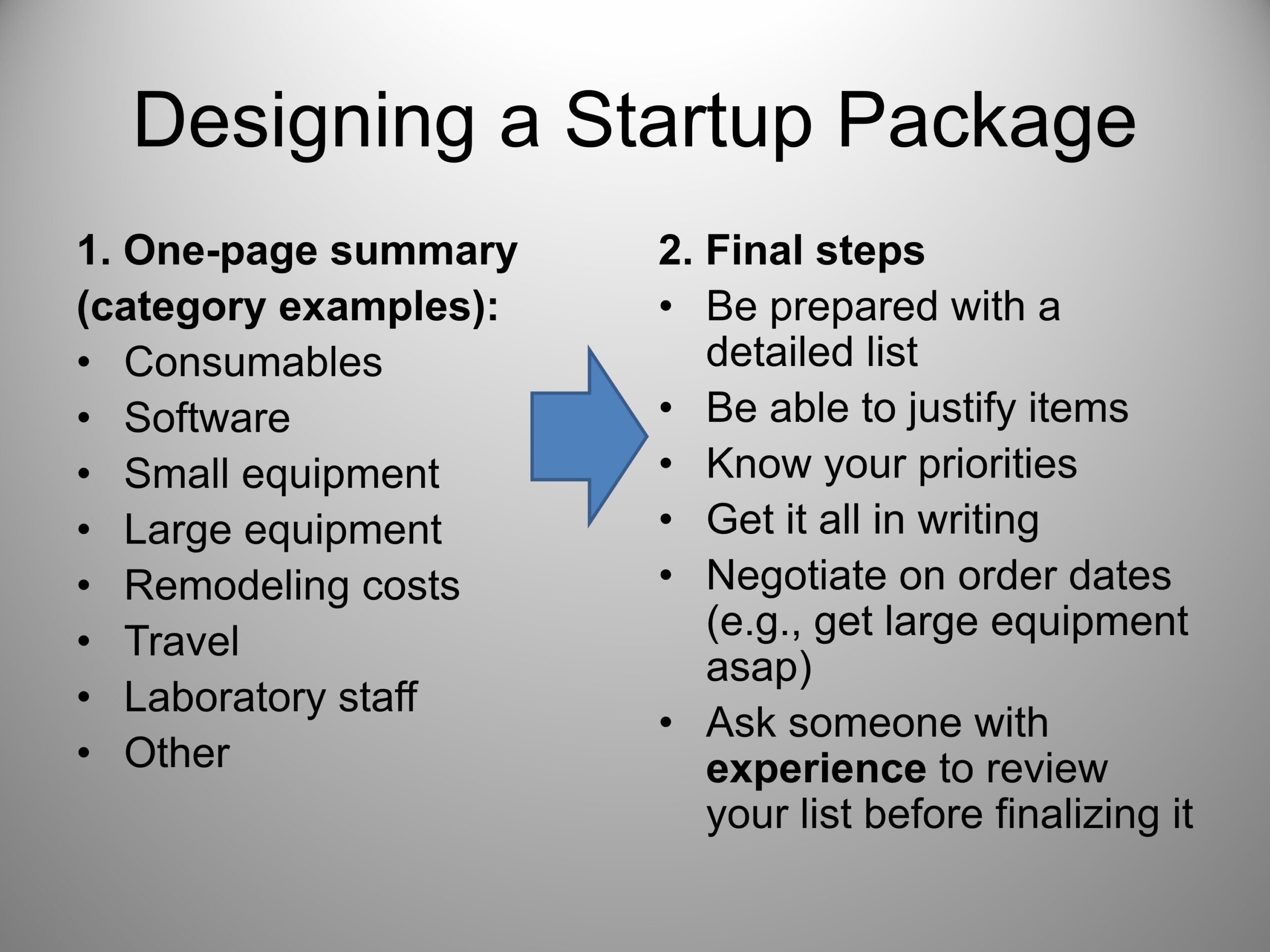
So here’s how we go about it.
Designing a startup package. First you should have a one page summary. Carry this around with you when you go on a job interview. This could include the major categories of consumables. Software and so forth. The final steps when you actually get to the point of negotiation; accepting an offer.
Be prepared with a detailed list of specific pieces of equipment. Even a vendor. Where do you get it?
Be able to justify each item. You have to justify. You don’t say, well I’d like to have this. You need to say why it’s important for your research program.
Know your priorities because you may have to give and take. You may have to give up some things. Know which ones are absolutely essential to your research project.
Get it in writing. Don’t trust any oral commitments. Too often we have seen that a dean somewhere has said, oh yes we can do that. The next year that dean is gone. The new dean says, I have no record of that.
Negotiate on order dates. When you’re starting a job you don’t want to get there and then wait two years before your equipment shows up. Very often, you can arrange to have that equipment delivered before you get there. You want to hit the ground running.
And a very important thing. Ask someone with experience to review your list. You might not think of everything. Because chances are, you’ve never had the responsibility of ordering all the things that are needed for a lab. So talk to your mentor. Talk to someone who’s done similar kinds of research and ask them. How is this list? What have I missed? Do I have enough here? Is this going to take care of it?
How much?
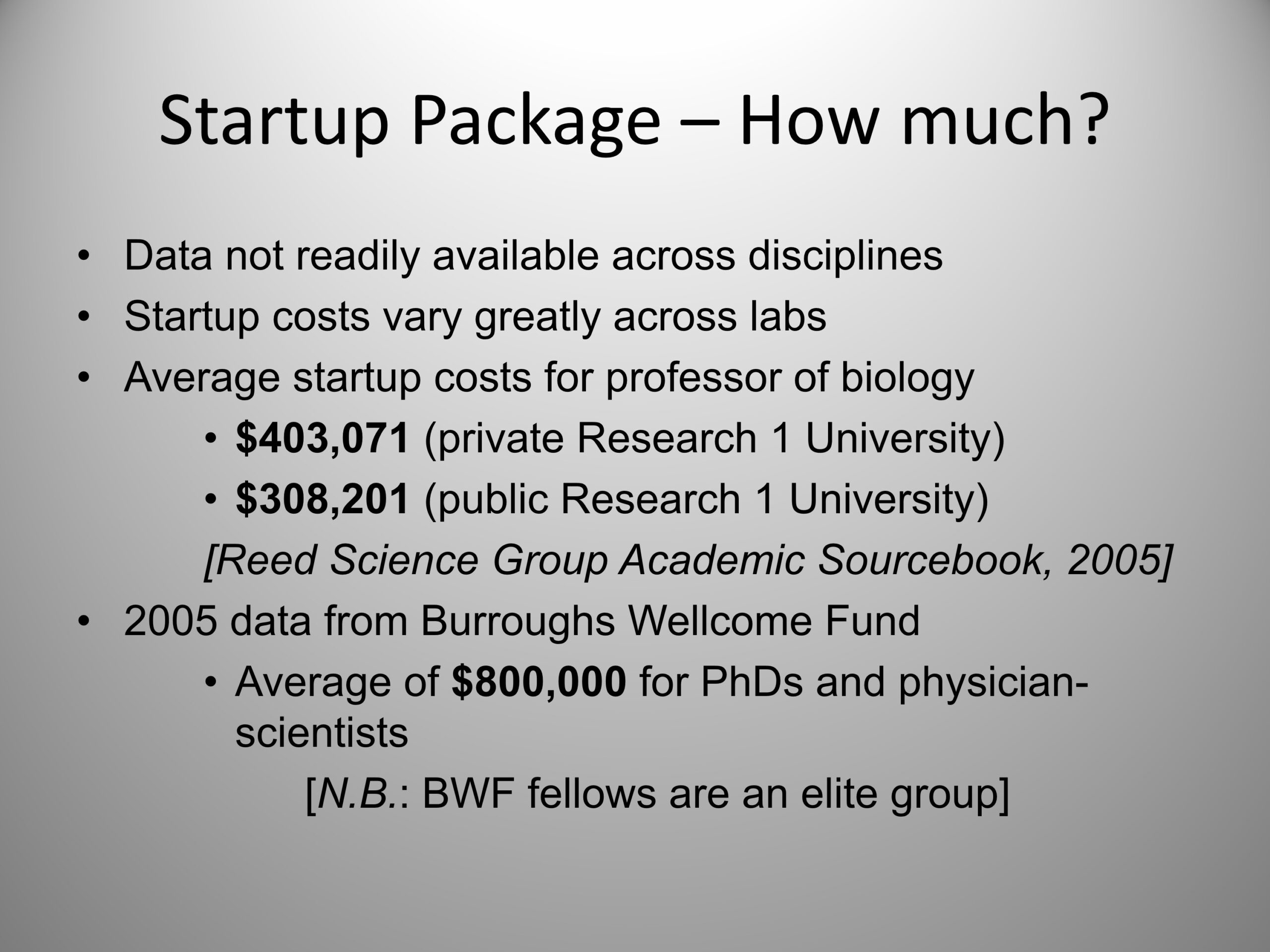
This gets down to the nitty-gritty. How much money should you ask for?
I’ve heard of people starting as assistant professors in communication sciences and disorders departments, who didn’t have anything written down for a startup package. Nothing.
What should you ask for? Well, first of all, data are not readily available across disciplines. Understandably, universities and research institutions don’t want to share this. They don’t want to put people in there competing with one another. But we do have some data available.
They vary a lot across labs. Notice in the middle there, the average startup cost for a professor of biology in the old Carnegie system, a research 1 university is $403,000 is the average in biology. For a public research 1 university, $308,000.
Now my understanding is that about 5 years ago, a new professor of chemistry or biochemistry, could get a startup package of a half a million minimum. That was a while ago. Right now we’re probably talking $750,000 to a million dollars.
The average for PhDs and physician scientists in the Burroughs Wellcome Fund, $800,000 startup package.
Now why does it matter? Well imagine that you’re going in for NIH funding. At a time when it’s very difficult to get funding, and at a time when very often budgets are cut, sliced. Equipment may be an item that’s very difficult for you to get.
When the institution hires you, they’re making a commitment to millions of dollars if you stay there for your entire career. It’s a multi-million dollar commitment. They want to see you succeed.
One of the big things they can do to make you succeed is give you a startup package that guarantees you can do the work you want to do. So the startup package is key.
The problem is, a lot of young people don’t have any idea what is a reasonable startup package. Again, for good reason. Nobody shares the data. But there are a few hints we can find here.
Now if our field of CSD goes into granting institutions and begins to make requests of money, how are we going to compare against, let’s say, biologists, neuroscientists and others, if they’re already sitting on a lab development that’s worth close to a half a million dollars? If our people say, oh I need a new computer. So they get a computer on their desk and that’s their startup package, right away they’re putting themselves at an extraordinary disadvantage with respect to the rest of science.
So I think a critical piece of advice we should give to new hires is learn about startup packages.
Yes, look at the salary and you can find salary figures. But don’t underestimate the value of the startup package. That will get you going sooner and faster than anything else you can do.
It’ll give you the equipment. Now I’m not talking just about equipment. I’m talking about consumables. I’m talking about maybe a research assistant for the first year. Those are the kinds of things that can really work to get you going.